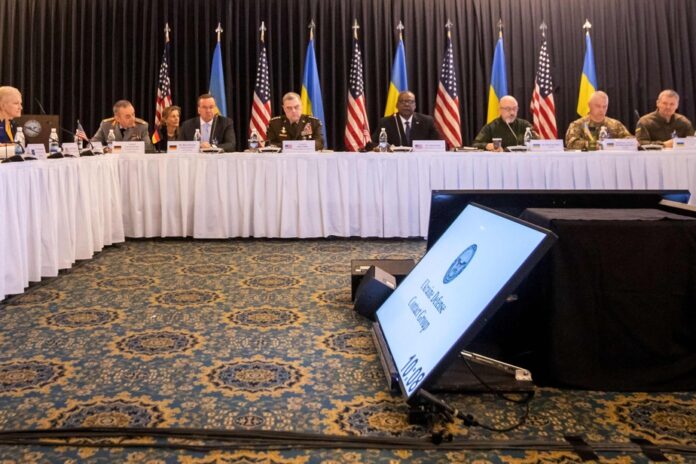(Ramstein) NATO Secretary General Jens Stoltenberg said he was “confident” that Ukraine could regain ground against the Russians, through a possible counter-offensive which Volodymyr Zelensky urges his supporters to deliver more arms and ammunition.
Meeting on Friday at the US base in Ramstein, Germany, Kyiv’s international allies are “reviewing the various capabilities, systems and supplies that the Ukrainians need to regain more ground,” Stoltenberg told reporters.
“I have confidence that they [the Ukrainians] will now be able to free up even more ground,” he said.
On a visit to Kyiv on Thursday, the NATO chief spoke there with President Zelensky, who constantly calls on the West to deliver more armored vehicles, artillery, ammunition and also military planes. combat and long-range firing systems to hit Russian warehouses, far behind the front line.
“Together, we will ensure that Ukraine has everything it needs to live in freedom,” said US Secretary of Defense Lloyd Austin at Ramstein, where some 50 countries are represented.
The meeting began with discussions between Mr. Austin and his Ukrainian counterpart Oleksiï Reznikov, which the latter considered “fruitful”.
Between insufficient stocks, fear of escalation and logistical problems, Europeans and Americans have however been more cautious than Kyiv would have liked.
Slovakia and Poland began supplying Ukraine with Soviet-designed MiG-29 fighters.
But sending modern Western-designed aircraft has yet to be discussed. Several countries have shown overtures and a decision would be possible “before the summer”, the Danish Minister of Defense recently asserted.
The Alliance is focused on supplying ammunition and spare parts to ensure that the systems already deployed in Ukraine “have the desired effect”, Mr. Stoltenberg stressed on Friday.
“It is now a battle of attrition and a battle of attrition becomes a war of logistics,” he explained.
Ukrainian, Polish and German representatives have agreed to set up a “joint repair center in Poland for the entire fleet” of Leopard 2 tanks, German Defense Minister Boris Pistorius announced.
After resisting Russian assaults on the eastern front all winter, Ukrainian forces say they are preparing their own offensive for spring or summer.
Ukraine announced this week that it had received the first American Patriot air defense systems, an operation coordinated by the United States, Germany and the Netherlands.
British and German heavy tanks have also been delivered since late March after being long requested by Kyiv. American Abrams tanks could follow soon.
Jens Stoltenberg’s visit to Kyiv was also an opportunity for Volodymyr Zelensky to insistently ask the Atlantic Alliance to invite his country to join it.
Stoltenberg reiterated NATO’s support for Ukrainian ambitions, saying Kyiv’s “future” is in the “Euro-Atlantic family” but said nothing about the timing.
This rapprochement ulcerates the Kremlin, which on Friday castigated, through the voice of its spokesman Dmitry Peskov, the “aggressive nature” of the Atlantic Alliance, guilty according to him of “trying to absorb and drag Ukraine in the Alliance”. “We are dealing with an aggressive bloc that sees our country as an enemy.”
Ukraine has been calling for its membership of this organization for years and even more since the outbreak of the Russian invasion, seeing in it the only real guarantee of its security against Moscow.
Favorable in principle to this prospect, NATO is on the other hand very vague on the deadlines, an entry of this country into its midst risking an escalation in the conflict because Russia considers such an enlargement as a red line.
“The main goal is to make sure Ukraine wins” because otherwise it “makes no sense to discuss membership,” Mr. Stoltenberg noted.
The Kremlin once again denied on Friday any intention to launch a second mobilization campaign to send men to Ukraine, in response to articles about students summoned by the army.
“There are no discussions in the Kremlin about any wave of mobilization,” presidential spokesman Dmitry Peskov told reporters.
He was responding to a question about reports in Russian media about university students receiving military conscriptions in Moscow and other Russian cities.
“Honestly, this is the first I’ve heard of this,” Mr. Peskov said. “What summons?” I don’t even know” what it is, he insisted.
In September 2022, the Kremlin announced the mobilization of several hundred thousand men of fighting age to give new impetus to its struggling offensive in Ukraine.
Since then, rumors of a new wave of summons have been rife, especially since Vladimir Putin last week signed a law hastily passed by Parliament facilitating the mobilization.
Before, the summons had to be delivered by hand to the mobilized, which allowed many men to escape the first wave in September, in particular by fleeing abroad or hiding with relatives.
From now on, the refusal to present themselves at the enrollment office will deprive the interested parties of the possibility of working as an entrepreneur or self-employed person, of receiving loans or of disposing of their accommodation and their car.
The authorities, who already denied any hint of mobilization before the sudden announcement of the first wave last year, voted this new law at a time when Kyiv forces say they are preparing a major counter-offensive in Ukraine.


















